Solar Installers Crigglestone
Find top Solar Companies in Crigglestone
Get up to 3 Solar Installer quotes for your project today! Compare profiles, reviews, accreditations, portfolio, etc... and choose the best deal.
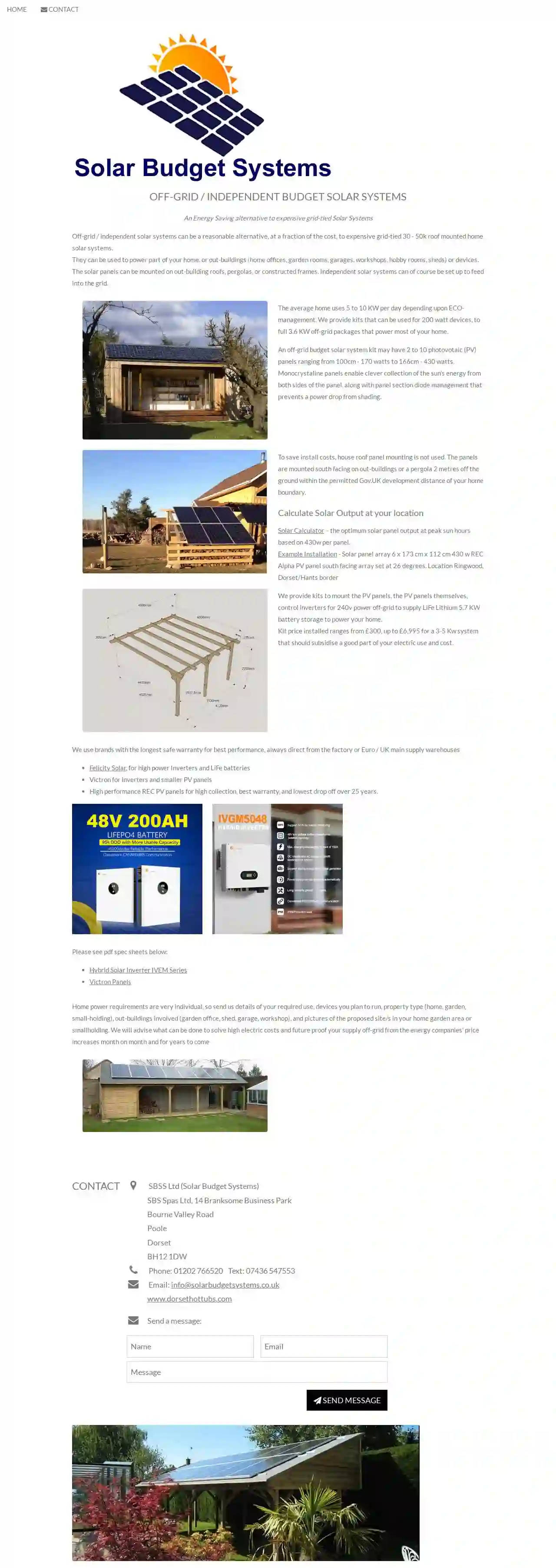
Solar Budget Systems
Bourne Valley Road, 14 Branksome Business Park, Poole, BH12 1DW, GBSolar Budget Systems (SBSS) offers off-grid and independent solar power solutions as a cost-effective alternative to traditional grid-tied systems. Our systems can power homes, outbuildings, or individual devices, providing energy independence and reducing reliance on expensive grid electricity. We understand that every home's energy needs are unique. That's why we offer customizable kits ranging from 200-watt devices to full 3.6kW off-grid packages. Our systems utilize monocrystalline panels for efficient energy collection and feature diode management to prevent power loss from shading. To minimize installation costs, we mount panels on south-facing outbuildings or pergolas, ensuring optimal sun exposure. We provide all necessary components, including PV panels, control inverters, and LiFe Lithium battery storage. Our team of experts will work with you to assess your energy requirements, recommend the best system configuration, and provide expert installation. We use trusted brands like REC, Victron, and Felicity Solar, known for their high performance and long warranties. Contact us today for a free consultation and discover how Solar Budget Systems can help you achieve energy independence and save on your electricity bills.
- Services
- Why Us?
- Gallery
Get Quote
Bright Sky Solar Ltd
Stanley, GBWelcome to our reputable Solar Energy Company, where our extensive experience in providing and installing renewable energy solutions sets us apart. Our unwavering dedication lies in assisting our clients in harnessing the advantages of clean electricity, benefiting both our planet and your wallet. Get your FREE Quote Today! We are an established Solar Energy Company with many years experience in the supply & installation of renewable energy. We have a passion for helping our clients reap the benefits of green electricity – saving our planet and saving your money. We are NAPIT Electrical Contractors and our installation teams and engineers are approved and registered Renewable Energy Installers who work directly for us. Find out more... Why choose Bright Sky Solar to install your solar panels? Bright Sky Solar are recognised as one of the UK’s most trusted solar panel installers. We are fully MCS accredited, TrustMark approved and a proud HIES member. This means that all projects are fully protected and completed by our accredited tradesmen. Request a QuoteContact us We specialise in Commerical Solar Panel Installations By installing commercial solar panels at your premises you can bring your energy costs down by creating your own electricity, from unused space. Domestic Solar Panel Installations Specialising in bespoke domestic solar PV installations with and without battery storage. Solar Battery Storage Installations Solar battery storage is the next logical step to boost your savings whilst reducing your energy bills.. EV Home Charger Installations Charging your electric car at home will save you up to £1000 per year.
- Services
- Why Us?
- Accreditations
- Our Team
- Testimonials
- Gallery
Get Quote
Meridian Environmental Ltd
52 reviewsStanley, GBMeridian Environmental is a company based in Dorset, UK, specializing in electrical contracting and renewable energy solutions. They offer a range of services, including commercial and domestic solar PV installation, battery storage, electric vehicle charging, electrical testing and inspection, and commercial electrical contracting. With a focus on providing fast, professional service, Meridian Environmental is committed to helping businesses and homeowners reduce their energy costs and carbon footprint. They are fully qualified and insured, and have a proven track record of delivering high-quality results.
- Services
- Why Us?
- Gallery
Get Quote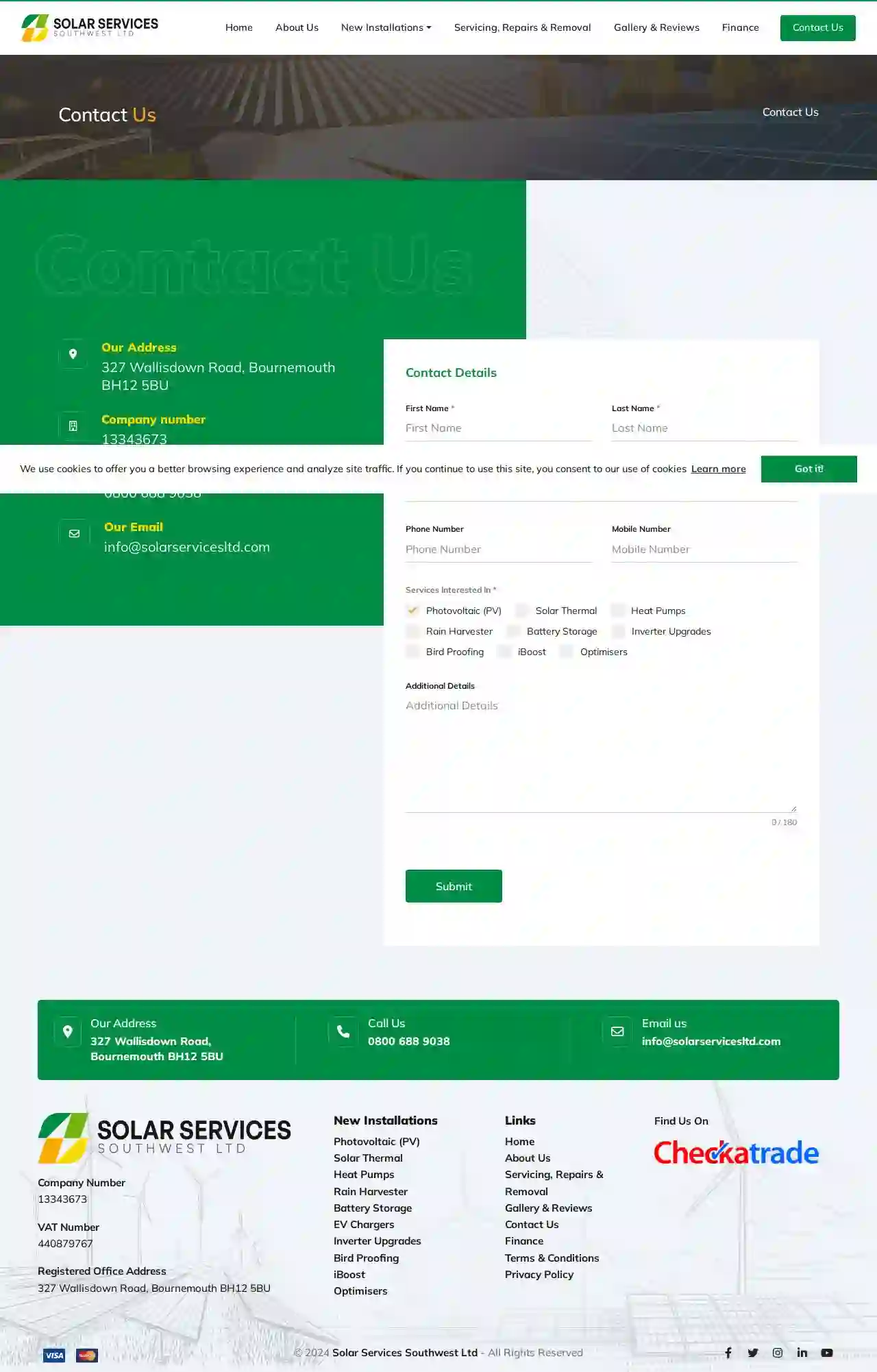
Solar Services Southwest Ltd
327 Wallisdown Road, Bournemouth, BH12 5BU, GBSolar Services Southwest LTD is one of the most reputable solar companies in the south. In a world where fossil fuels are limited, nuclear is dangerous and expensive, and neither are sustainable – the goal of SSS is to continue to contribute towards the development and deployment of clean, renewable solar generation and storage technology whilst saving you as much money as possible at the same time. What could be better! SSS act on a constant commitment and passion for providing clean energy solutions at an affordable price, no matter how big or small the project. Here at SSS, we consider our main asset to be our skilled and experienced staff, enabling practical and innovative solutions to new construction and maintenance work.
- Services
- Why Us?
- Gallery
Get Quote
Batchelor Electrical Contractors
Cabot Lane, Poole, 15 Albany Business Park, BH17 7BX, GBSince 1992, Batchelor Electrical has built a strong reputation in the UK as a leading electrical contractor to the commercial and fit-out sector, boasting an enviable client list. We are forward-thinking pioneers in the UK solar industry since 2004, having completed hundreds of projects ranging from supermarket and commercial roofs to large social housing schemes and solar car ports. Our energy reduction services have expanded even further to include LED lighting schemes, energy consultancy, and battery storage. Batchelor Electrical is a specialist in its sector, providing a nationwide service from initial concept through to project completion.
- Services
- Why Us?
- Gallery
Get Quote
Voltease
4.36 reviewsOxford, Oxfordshire, 123 Oxford Street, OX1 1AA, GBVolteaase is a leading provider of innovative, cost-effective, and sustainable solutions for the water industry. Our mission is to empower water professionals to make a positive impact on the environment and their communities. With a strong focus on research and development, we continuously strive to improve our products and services, ensuring our customers receive the best possible solutions for their water treatment needs.
- Services
- Why Us?
- Accreditations
- Our Team
- Testimonials
Get Quote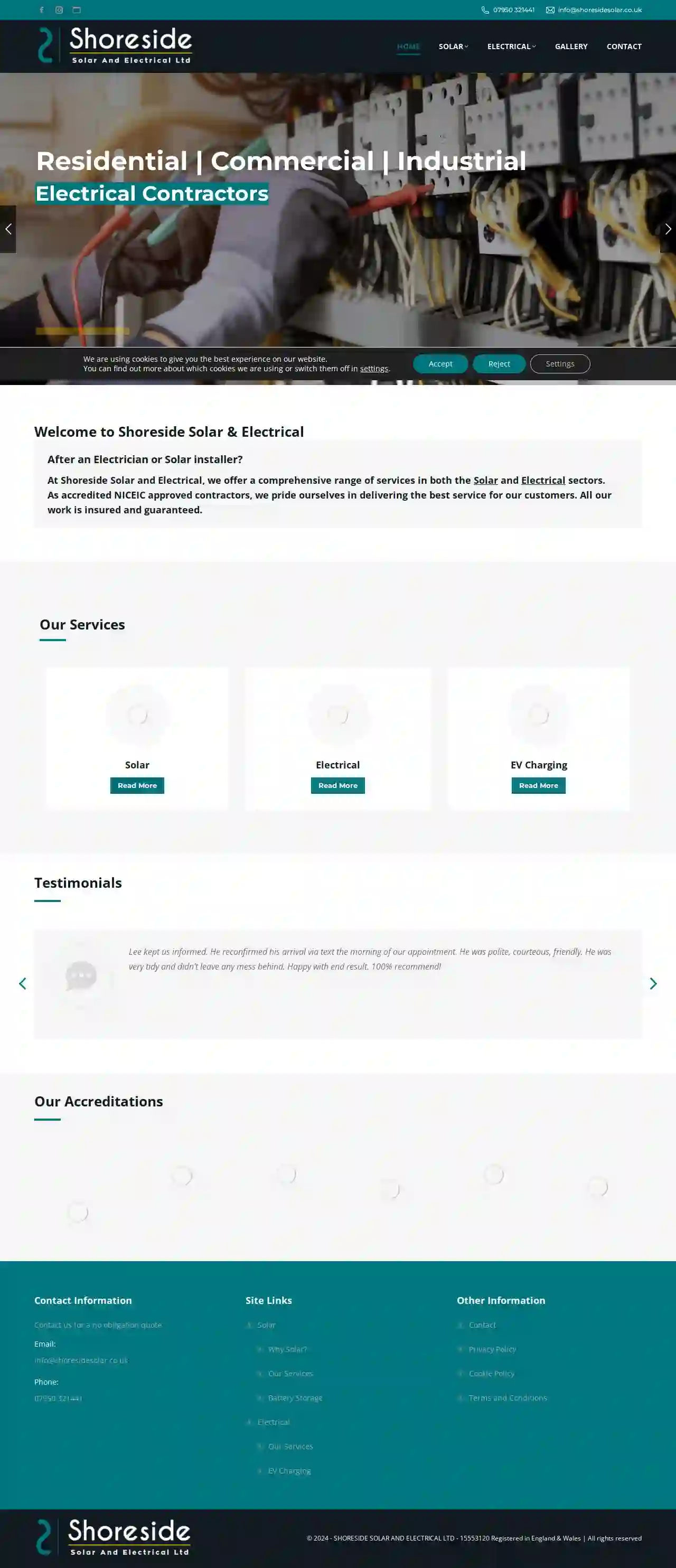
Shoreside Solar and Electrical
Stanley, GBWelcome to Shoreside Solar & Electrical, a comprehensive range of services in both the Solar and Electrical sectors. As accredited NICEIC approved contractors, we pride ourselves in delivering the best service for our customers. All our work is insured and guaranteed. We offer a range of services including Solar, Electrical, and EV Charging. Our team is dedicated to providing excellent customer service and ensuring that our customers are satisfied with the work we do.
- Services
- Why Us?
- Accreditations
- Our Team
- Testimonials
- Gallery
Get Quote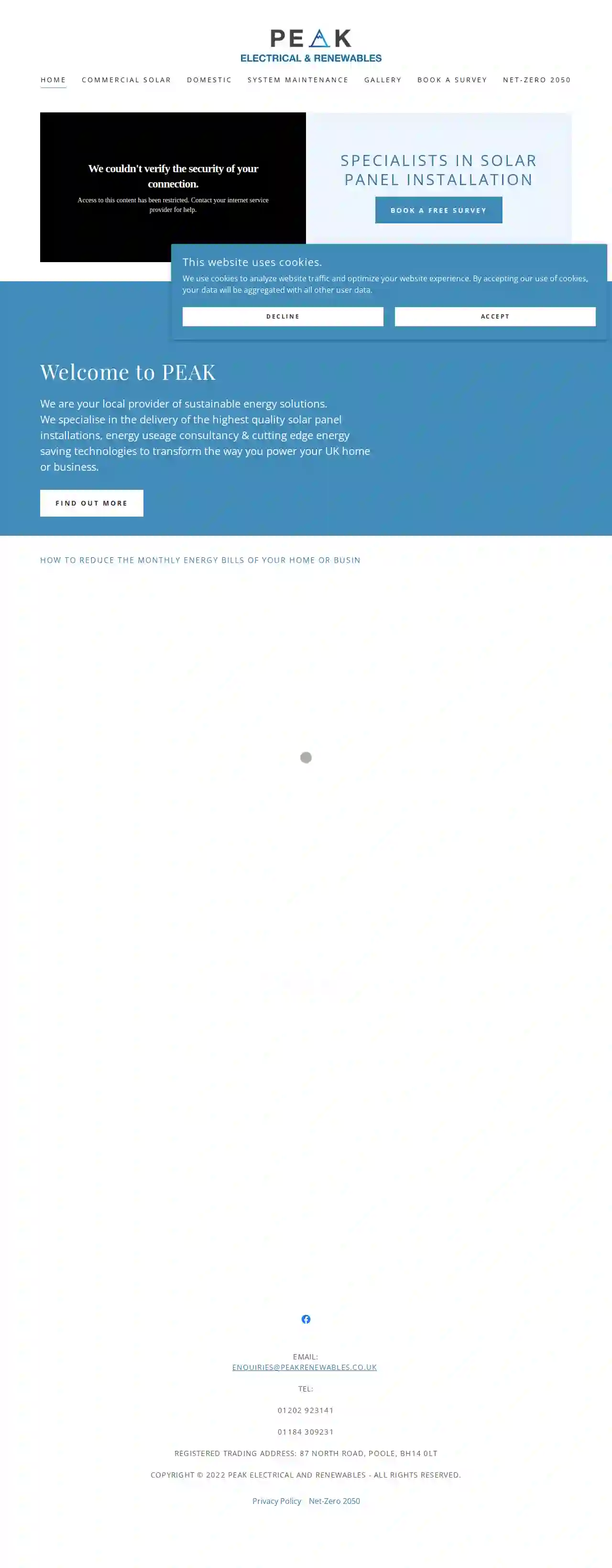
Peak Electrical & Renewables - Solar Panel installation, cleaning and maintenance in Dorset, Berkshire and the South
519 reviews87 North Road, Poole, BH14 0LT, GBYour local Solar Panel installation specialists book a free survey Solar Panel Installations By PEAKWe are your local provider of sustainable energy solutions. We specialise in the delivery of the highest quality solar panel installations, energy useage consultancy & cutting edge energy saving technologies to transform the way you power your UK home, business or school.Find out more how to reduce the monthly energy bills of your home or business. Testimonials
- Services
- Why Us?
- Gallery
Get Quote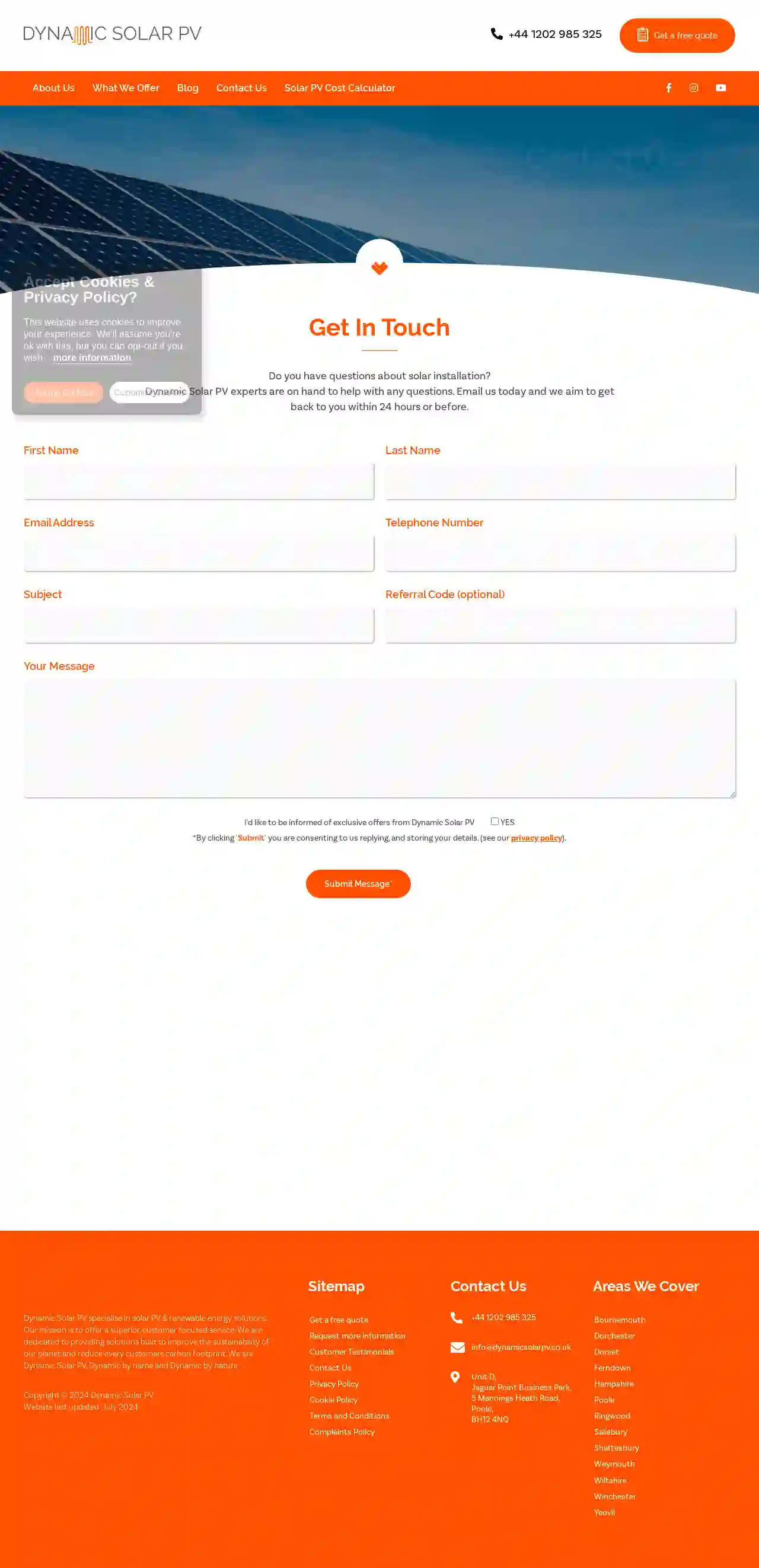
Dynamic Solar PV
Unit D, Jaguar Point Business Park, 5 Mannings Heath Road, Poole, BH12 4NQ, GBDynamic Solar PV is a company dedicated to providing end-to-end solutions for solar PV installation requirements. We strive to offer a superior, customer-focused service, aiming to improve the sustainability of our planet and reduce every customer's carbon footprint. Our mission is to offer a superior, customer-focused service built to improve the sustainability of our planet and reduce every customer's carbon footprint. We are Dynamic Solar PV, Dynamic by name and Dynamic by nature.
- Services
- Why Us?
- Gallery
Get Quote
Save Energy UK ltd
4.727 reviewsUnit 20, The Glenmore Centre, Fancy Rd, Poole, BH12 4FB, GBOver 19 years as your solar system specialists. We pride ourselves on good products, good pricing and good backup service. For over 19 years we have been providing Solar Systems service and installs across the whole of the South of the UK. We only supply high quality products and we are very proud of our ongoing backup services that we supply to our clients. Save Energy UK takes immense pride in its extensive and illustrious 19-year legacy, which stands as a testament to our unwavering commitment to excellence. Over the years, we have continually excelled in delivering exceptional pre-sales and post-sales services that go above and beyond industry standards. Our team of experts has consistently provided invaluable guidance, cutting-edge design solutions, and flawless workmanship across the entire spectrum of our products and services.
- Services
- Why Us?
- Accreditations
- Gallery
Get Quote
Over 3,485+ Solar Businesses in our network
Our solar experts operate in Crigglestone and surroundings!
SolarCompaniesHub has curated and vetted Top Solar Contractors arround Crigglestone. Find a reliable pro today.
Frequently Asked Questions About Solar Installers
- Contact SolarCompaniesHub: We make it simple to connect with reputable Solar Installers in your area.
- Get Free Quotes: Request free quotes from multiple installers to compare prices, systems, and warranties.
- Schedule a Site Assessment: A qualified installer will visit your property to assess your roof, energy needs, and discuss your goals.
- Review Your Proposal and Contract: Carefully review the proposed system, financing options, and warranties before signing a contract.
- Installation and Activation: Once the contract is signed, the installer will obtain necessary permits, schedule the installation, and activate your solar system.
- Draw electricity from the grid when your solar panels aren't producing enough power (e.g., at night)
- Sell excess solar electricity back to the grid through net metering.
Do I need to replace my roof before installing solar panels?
How do I get started with solar panel installation?
What is the lifespan of solar panels?
What is the difference between grid-tied and off-grid solar systems?
Do I need to replace my roof before installing solar panels?
How do I get started with solar panel installation?
- Contact SolarCompaniesHub: We make it simple to connect with reputable Solar Installers in your area.
- Get Free Quotes: Request free quotes from multiple installers to compare prices, systems, and warranties.
- Schedule a Site Assessment: A qualified installer will visit your property to assess your roof, energy needs, and discuss your goals.
- Review Your Proposal and Contract: Carefully review the proposed system, financing options, and warranties before signing a contract.
- Installation and Activation: Once the contract is signed, the installer will obtain necessary permits, schedule the installation, and activate your solar system.
What is the lifespan of solar panels?
What is the difference between grid-tied and off-grid solar systems?
- Draw electricity from the grid when your solar panels aren't producing enough power (e.g., at night)
- Sell excess solar electricity back to the grid through net metering.